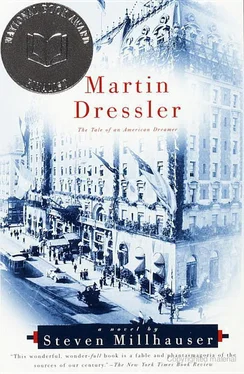Margaret Vernon, who at the news of Mr. Westerhoven’s offer had clasped her hands at her throat and looked at him with a kind of eager delight, continued to clasp her hands while her look changed to the polite blankness with which she had been taught to conceal disapproval or confusion; Caroline glanced away; Emmeline leaned forward and said fiercely, “Good for you, Martin. Now you’ll show them.”
“Show them what, dear?” asked Margaret Vernon, and cleared her throat.
“Oh, mother,” Emmeline said.
“Not a bad question, actually,” Martin said.
“Show them what he can do,” Emmeline said. “Without them.”
“I understand, Emmy, of course I do, but I was wondering …”
“Does this mean …,” Caroline said. “Yes?” asked Martin sharply.
“Oh, nothing,” Caroline said.
“I think what Caroline means,” began Mrs. Vernon, bursting into a cough.
16. Business and Pleasure
A SLANTING RAIN DROVE AGAINST THE AWNING, rushed in black rivulets along the curbs, glistened on the backs of cabhorses and flew from rattling wheels, worked its way down behind the awning and trickled along the restaurant window.
“You can say what you like,” Martin said at the window table, “but my mind is made up. Are you coming in with me or aren’t you?”
“Now hold on, Martin,” Dundee said. “One thing at a time. Are you sure you’ve thought this thing through? Do you know what you want?”
“I know what I damn well don’t want,” Martin said. “I don’t want to become Mr. George Henning.”
“Slim chance of that, Martin.” Dundee slapped the table with the flat of his hand. “Don’t you see what it is? They’re grooming you for manager. Six years at a bet, maybe five. You could take this hotel—”
“I don’t want to take it. I want to leave it.” Martin heard something harsh and contemptuous in his tone and made an effort to speak evenly. “I’m cut out for something else.”
“And what may that be?”
“Something”—Martin shrugged impatiently—“larger. It’ll come to me. But right now: are you in with me or not?”
“I’m a hotel man, Martin. I don’t aim to set up in a new line of work at this stage of the game. But this scheme of yours — I won’t stand in your way.”
“Then I can borrow against the business—”
“For one more lunchroom. After that I plan to sit tight, keep my money safe in the bank. Pick up a little railroad stock, maybe.”
“Suit yourself.” Martin looked out the window at dark streetcar rails glistening in the rain. “I was thinking of Westerhoven’s rubbers. He hung them on the hat rack to dry. They dripped a puddle onto his rug. I suppose I’ll miss the old place once I’m out of it for good.”
“Martin!” cried Dundee. “Take the job. It’s the chance of a lifetime.”
Martin turned to him with a look of surprise.
As he threw himself into the adventure of his new life, Martin realized how hungry he had been for time, sheer time. Now he rose at five in the morning to walk the still-dark avenues, observing the early morning El stations, the streetcars, the opening of newsstands and streetcorner cafes, the movement of people on the sidewalks. He stood on corners of cross streets and avenues, counting the number of people who passed in ten-minute intervals, recording the numbers in a notebook, studying them over breakfast at restaurants up and down the West End, trying to work out a system. The original idea for converting the Paradise Musée into a lunchroom and billiard parlor had come out of nowhere — it had been an impulse, a whim — but he was convinced that he could now go about things in a clearheaded orderly way. Martin knew that what attracted him wasn’t the actual lunchroom, for he had no passion for lunchrooms, no special fondness for them, in a sense no interest in them; his passion was for working things out, bringing things together, arranging the unarrangeable, making combinations. Even the idea for a second lunchroom resembling the first had been a kind of lucky intuition, but the advantages of a string of separate yet related establishments now struck him as immense: an ad for one was an ad for all, so that advertising costs would be far less than if it were a question of three different businesses, and the risks of newness would be diminished by the air of familiarity lent to the newest member through deliberate association with the others. At the same time, larger food orders from a combination of lunchrooms meant discounts from suppliers. Money saved in purchasing and advertising meant increased profits — and increased profits meant another lunchroom.
But first it was necessary to look more closely at the operation of the two Metropolitans. The downtown manager was a business friend of Dundee’s, who had been the purchasing agent for the Vanderlyn dining rooms and had managed a lunch counter in one of the big department stores, and was grateful for the chance to manage a small business at a generous salary; he was a scrupulous and good-natured man who had the respect of his workers and provided detailed financial reports. He agreed with Martin that the two floors of billiard tables, though they turned a small profit, could be used to better purpose. The uptown manager had been recommended by a friend of Dundee’s and had struck Martin as being a little too fond of bay rum hair oil and heavy gold rings with raised initials. His reports were always late and included questionable expenses, he had already fired the cashier and two waiters, and he was often absent on unexplained business. Martin asked to see the books, noticed a few suspicious figures, and discovered that the new cashier, who turned out to be the manager’s brother, had been stealing fifty dollars a day. He fired both of them and threatened them with jail unless they returned the missing money. Fortunately the downtown manager knew someone who was perfect for the job and came with sterling references, but the incident impressed on Martin the importance of managers and the necessity for tight control of the business.
Of such things he spoke to the Vernons in the evenings, in the soft armchair in the quiet parlor, by the dark table with its dome-shaded porcelain lamp hand-painted with Nile-green sailboats, its gleam of slender glasses holding amber and emerald and ruby liquids. At times he wondered a little what they made of it all. Margaret Vernon listened with a dutiful and effortful attention, interrupted by fits of distraction during which she followed someone moving through the lobby, while Caroline listened without impatience but without any expression on her face. Only Emmeline asked questions. They were sharp, good questions, the questions of someone who knew what Martin was talking about and wanted to know more. It was she who grasped quickly the advantages of linked stores, the crucial role of managers, the need for strong central control. “If you sent out letters to your managers,” she said, leaning forward with a frown of concentration and one hand clenched in a fist on her knee, “say every month or so, stating your policy and making suggestions — some kind of monthly statement or letter, a reminder — then it seems to me—” and he saw it clearly, saw that it could be made to work. And he felt a flow of gratitude toward this energetic woman with the plain features and the too-thick eyebrows, a flow of brotherly affection, as if he had been married for some time to silent Caroline and had formed, with his sister-in-law, an intellectual friendship. Sometimes, when he tried to imagine his future life, a life in which he was the husband of Caroline, he saw himself seated in an armchair in the high-ceilinged bedroom of a grand hotel, talking pleasantly to Emmeline in the chair beside him, while a few feet away, on the edge of the polished brass bed, wearing a green silk dress, her pale hair pulled back tight, her hands interlaced in her lap and her eyelids half-closed, sat Caroline, silent, expressionless, inaccessible.
Читать дальше












